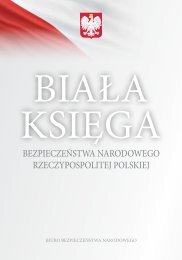You also want an ePaper? Increase the reach of your titles
YUMPU automatically turns print PDFs into web optimized ePapers that Google loves.
From Triumph to Stalemate: The Loss of American Consensus 23<br />
The post–Cold War era was an unusually sunny period for the<br />
West. Despite a range of emerging problems—nuclear proliferation<br />
in North Korea, Pakistan, and then Iran; the horrors in the Balkans,<br />
Rwanda, and then Darfur; the emergence of jihadist movements; and<br />
even the messy attempts to contain Saddam Hussein after the first<br />
Gulf War—the U.S. homeland and its citizens were largely untroubled<br />
by foreign affairs. The institutions that the United States helped build<br />
after World War II fostered a liberal international order that promoted<br />
free trade, democratic governance, the rule of law, global health, arms<br />
control agreements, human rights conventions, and a host of other<br />
norms and institutions that promoted peaceful global integration.<br />
The liberal order seemed to be living up to its Wilsonian promise<br />
as a time of global peace. 11 The order was opened to all who wanted to<br />
participate, and most did: About 3.5 billion people joined the global<br />
economy from the previously closed economies of the former Soviet<br />
Union, India, and China. Incomes soared, extreme poverty eroded,<br />
and the benefits of science, technology, and medicine reached millions<br />
who had been left out. A global middle class was born. It was one of<br />
the greatest periods of social and economic progress in human history.<br />
Democracy was also on the march. The number of countries<br />
deemed “fully free” nearly doubled from 44 in 1973 to 76 in 1992<br />
because of decolonization and the breakup of the Soviet Union,<br />
and peaked at 90 in 2007–2008 before falling back to 86 in 2016. 12<br />
The percentage of the global population living in countries that were<br />
free or partly free also surged (see Figure 2.4). Beginning in 2006,<br />
however, the degree of freedom in many emerging and some estabsion<br />
in Côte d’Ivoire in 2004, but after fighting broke out over a disputed election in 2010,<br />
it authorized a mission specifically to fulfill R2P duties. See United Nations Security Council<br />
Resolution 1975, on Cote D’Ivoire, March 30, 2011. However, R2P was not invoked under<br />
somewhat similar circumstances in Congo. See United Nations Regional Information Centre<br />
for Western Europe, “Responsibility to Protect: Two Case Studies with Alex Vines,” web page,<br />
undated.<br />
11 Walter Russell Mead, Special Providence: American Foreign Policy and How It Changed the<br />
World, New York: Taylor and Francis Group, 2009.<br />
12 Freedom House, Freedom in the World 2016: Anxious Dictators, Wavering Democracies,<br />
Washington, D.C., 2016a.




